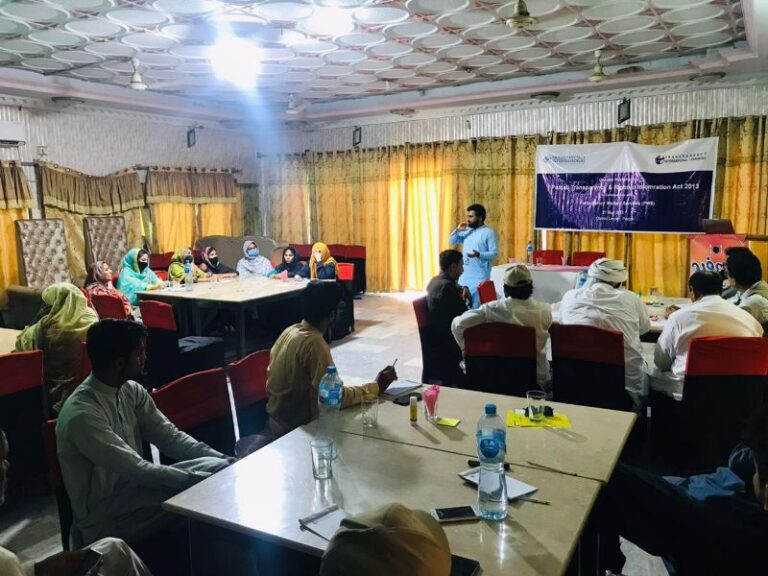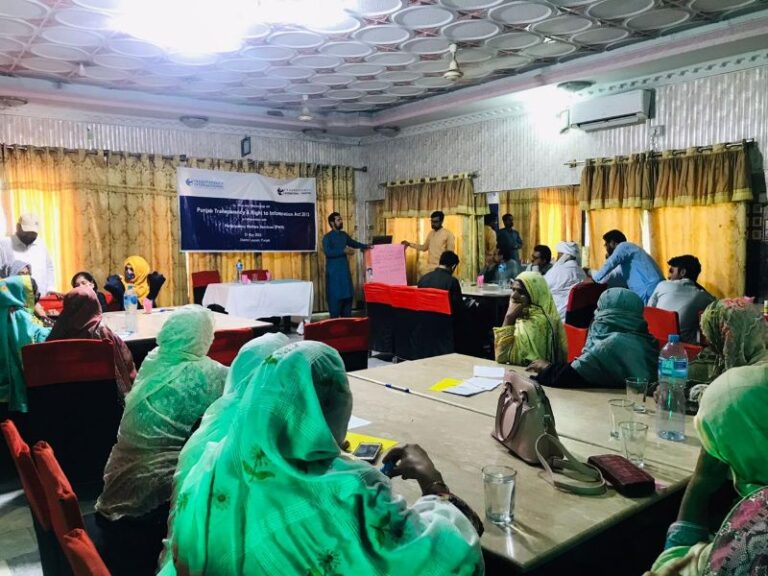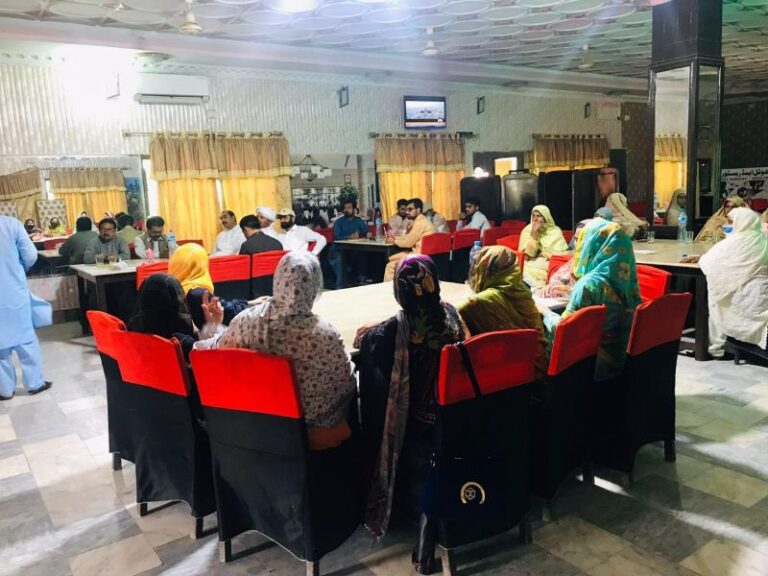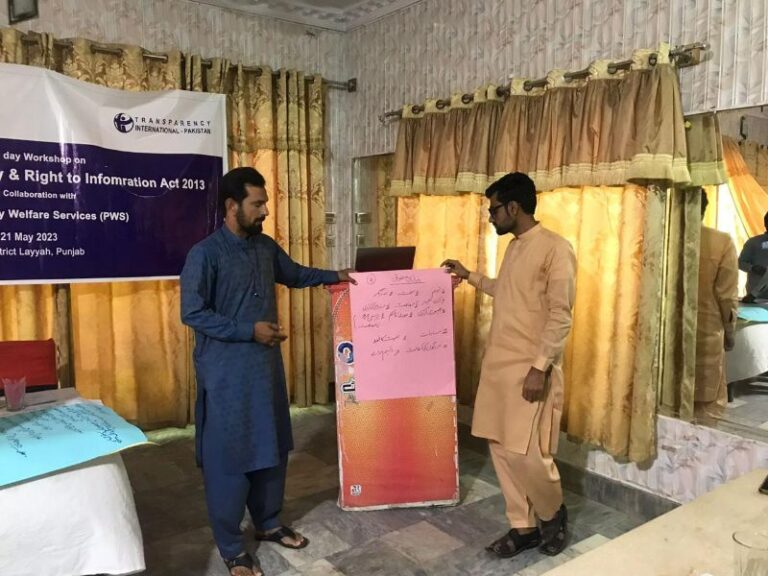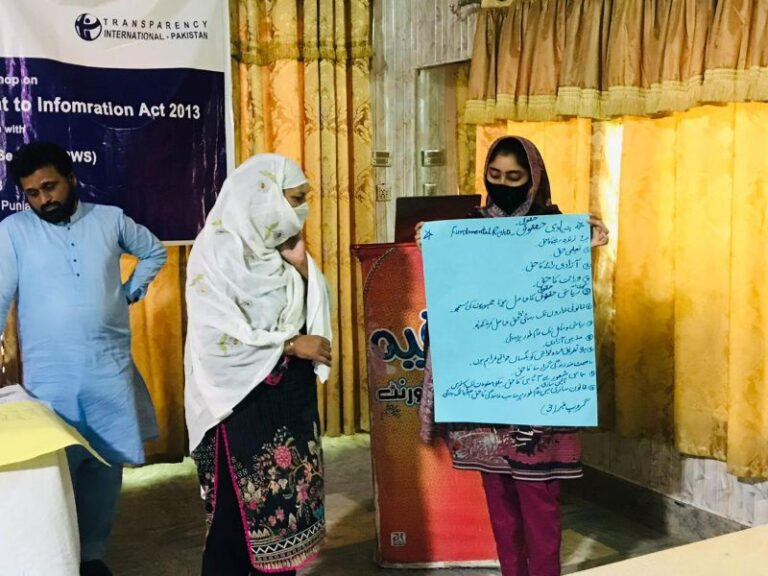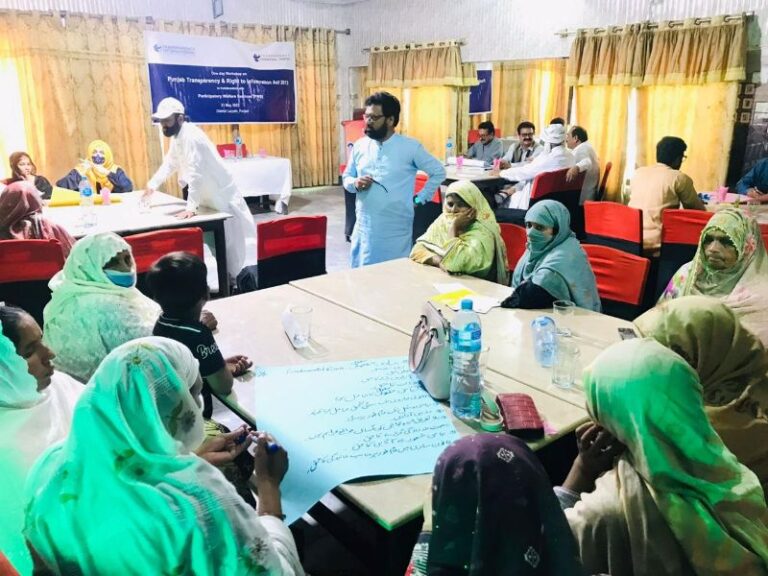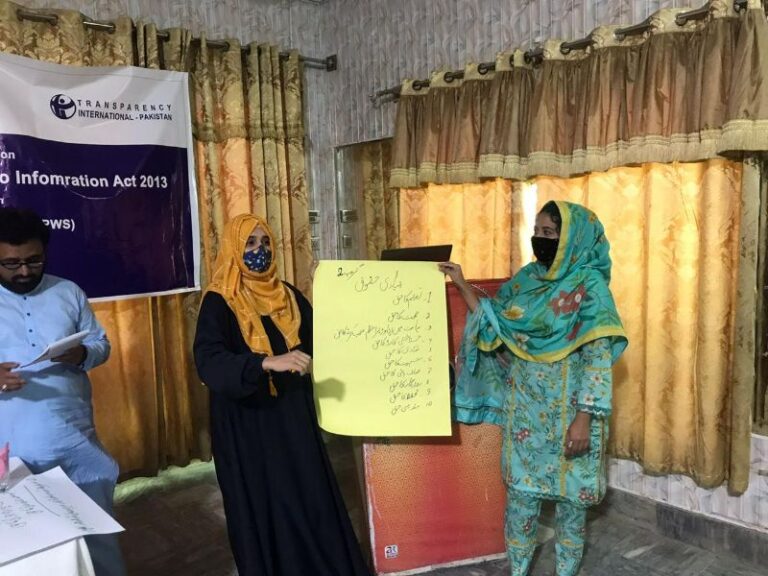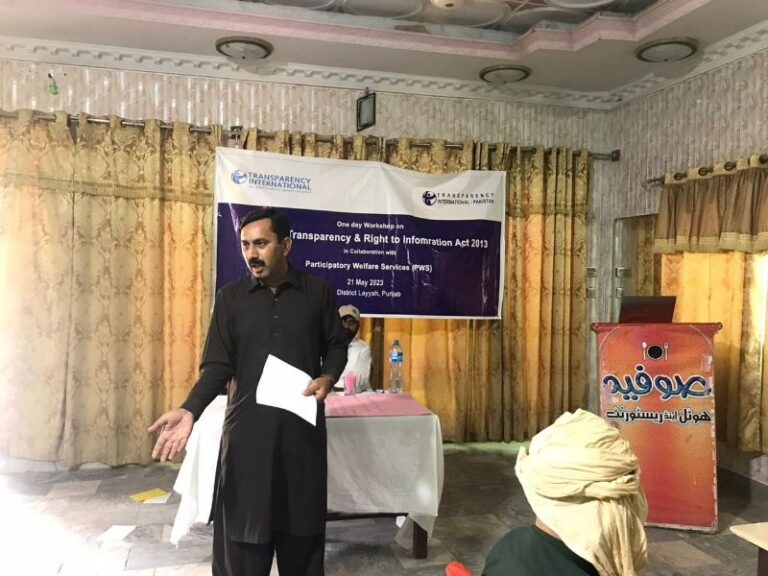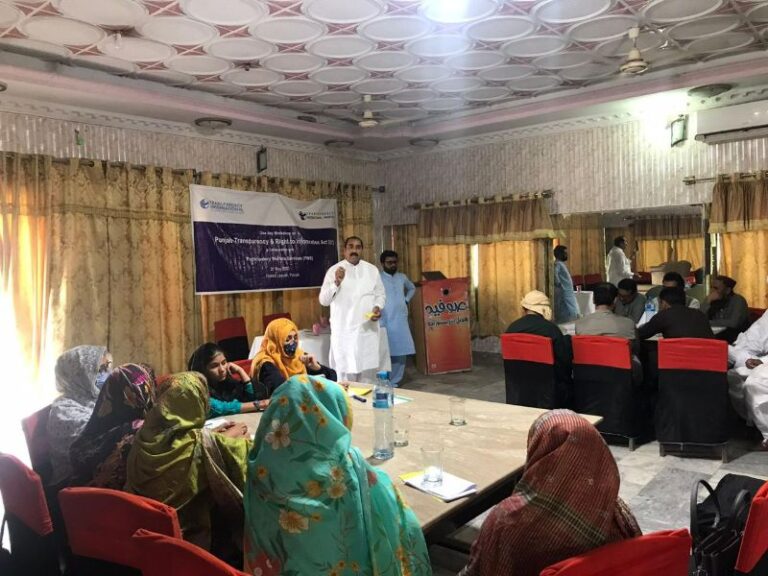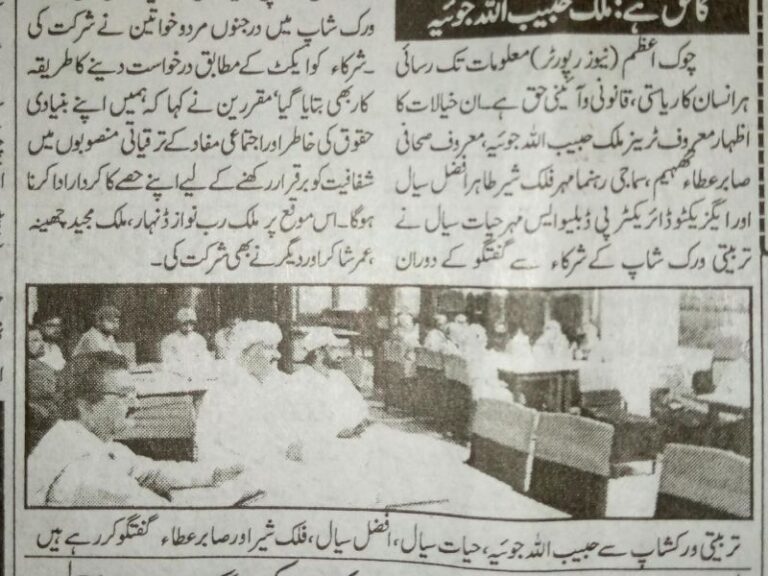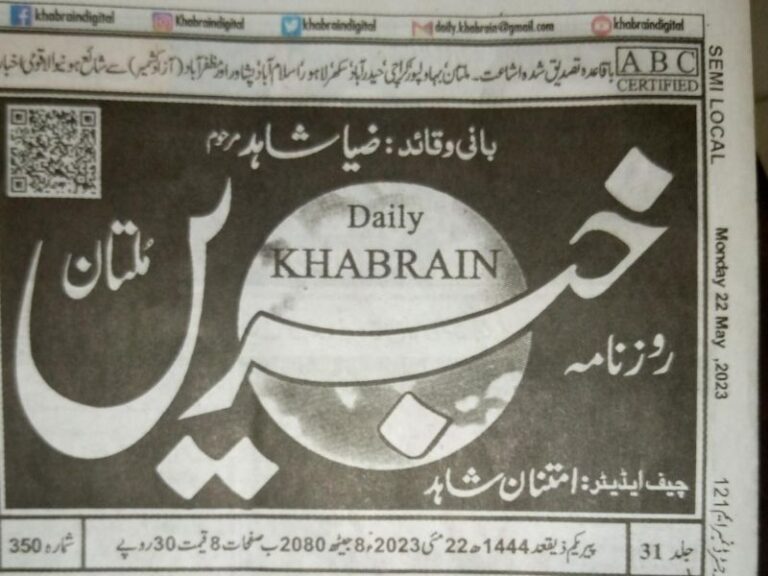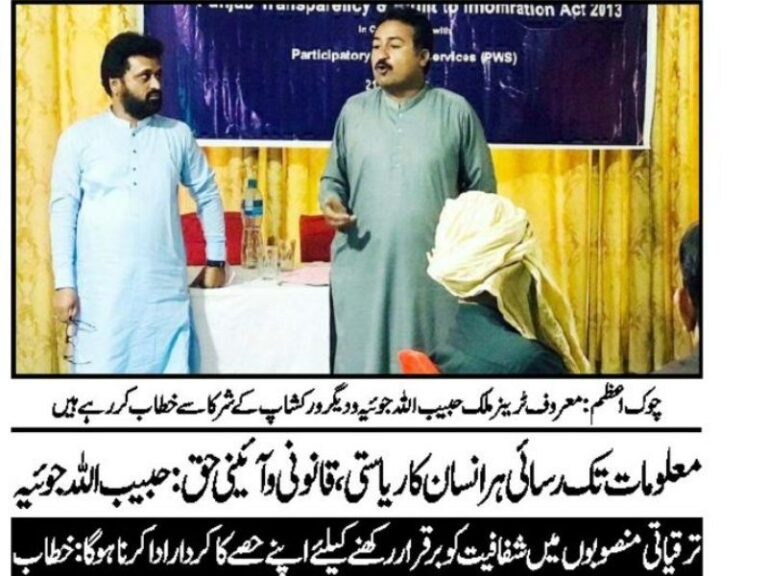- Home
- Workshop on Punjab Transparency and Right to Information Act 2013
Workshop on Punjab Transparency and Right to Information Act 2013
Workshop on Punjab Transparency and Right to Information Act 2013
Venue: Sofia Hotel, District Layyah, Punjab
Date: 20 May 2023
Transparency International Pakistan in collaboration with Participatory Welfare Services (PWS) organized one day workshop on Punjab Transparency and Right to Information Act 2013 in District Layyah, Punjab.
The workshop attracted a diverse group of participants, representatives from civil society organizations, activists, educators, students, and concerned citizens from Layyah and the surrounding areas. The total number of participants were 40 including 24 males and 16 females. The participants were eager to learn about the RTI Act and its significance in promoting transparency and accountability in governance. Mr. Habibulla Jowya and Mr. Falak Sheer were the two trainers.
The session started at 10:30 AM with the registration of the participants. Then Dr. Nadeem Afzal from Participatory Welfare Services welcomed the participants and gave the opening remarks. He also gave a brief overview of the Law. He told participants that the Right to Information (RTI) Act plays a pivotal role in promoting transparency in governance. It empowers citizens by granting them the right to access information held by public authorities. The RTI Act enables citizens to obtain information about government policies, decisions, and actions. It empowers individuals to actively engage in the democratic process, hold public authorities accountable, and make informed decisions.
Afterwards, the two trainers Mr. Habibulla Jowya and Mr. Falak Sheer explained the Punjab Transparency and Right to Information Act 2013 law and its key provisions in detail. They said that RTI Act contains several key provisions to facilitate the implementation of the right to information. It establishes the procedure for submitting information requests, outlines the responsibilities of public bodies in providing information, and sets the guidelines for the dissemination of information. Mr. Falak Sheer explained the definition of public bodies, type of information which can be sought under Punjab RTI Act and the information that is exempted. He further elaborated that any citizen can submit information request and receive responses within a specified timeframe of 14 working days.
He said that public bodies, on the other hand, have an obligation to provide requested information unless it falls under the prescribed exemptions. They must maintain records, appoint public information officers, and facilitate the dissemination of information through various means. These records should be provided under proactive disclosure clauses of the Punjab RTI Act 2013.
Moving on, Mr. Habibulla Jowya explained the Role of the Punjab Information Commission. He said that the Punjab Information Commission plays a crucial role in the implementation of the Punjab RTI Act. The commission is an independent and autonomous body responsible for ensuring compliance, resolving disputes, and promoting access to information. The Commission receives and adjudicates on complaints, monitors the performance of public bodies, and takes necessary measures to enhance transparency and accountability.
Next, Mr. Ahsan from PWS gave a detailed presentation on the role of civil society in strengthening RTI laws. He argued that civil society plays a crucial role in promoting the effective implementation of the Right to Information (RTI) Act. It can help raise awareness about the importance of transparency, conduct advocacy campaigns, and provide training and support to citizens on using the RTI Act. Civil society organizations also act as watchdogs, monitoring the implementation of the Act and holding public bodies accountable for their obligations.
Following a detailed training, question and answer (Q&A) session was held allowing the trainers to address participants queries and clarify any areas of uncertainty. The trainers provided satisfactory responses, ensuring that the participants questions were adequately answered and any unclear aspects were clarified. This interactive session helped enhance understanding of RTI law and its enhance demand side for its implementation.
At the conclusion of the workshop, group exercise was conducted to reinforce participants comprehension of the act. They were divided into smaller groups and assigned specific sections of the act to analyze and present their findings. This exercise effectively deepened their understanding of the act and its underlying concepts. Additionally, under the guidance of the trainers and organizers, participants were given the opportunity to write RTI applications, further applying their newly acquired knowledge.
In the final segment, Dr. Nadeem Afzal, Executive Director Participatory Welfare Services (PWS) expressed gratitude on behalf of the attendees, acknowledging the efforts of Transparency International Pakistan for organizing such a valuable event in their locality. He commended work of TI Pakistan towards fostering transparency in the country.
At the end, lunch was provided, offering an opportunity for participants to connect and further discuss the key takeaways from the workshop. The event was highlighted in social media, and local newspapers.


